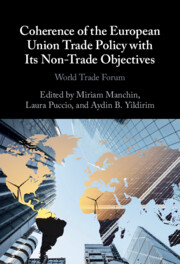Book contents
- Coherence of the European Union Trade Policy with Its Non-Trade Objectives
- Coherence of the European Union Trade Policy with Its Non-Trade Objectives
- Copyright page
- Contents
- Contributors
- Introduction
- 1 European Union Trade Policy and Non-Trade Issues
- 2 The European Union
- 3 Export Credit Agencies
- 4 The Effects of Non-Trade Provisions in Trade Agreements on Bilateral FDI
- 5 How EU Trade and Cooperation Policies Stimulated China to Go Green
- 6 The Role of Domestic Factors in the EU’s Governance of Labour Standards through Trade
- 7 EU Trade Agreements and Non-Trade Policy Objectives
- 8 Trade, the G20 and the EU
- 9 Enhancement of the European Parliament’s Monitoring for Better Coherence between Trade Policy and NTPOs
- Conclusion
- Index
- References
8 - Trade, the G20 and the EU
Soft Power for Greater Policy Coherence?
Published online by Cambridge University Press: 19 October 2023
- Coherence of the European Union Trade Policy with Its Non-Trade Objectives
- Coherence of the European Union Trade Policy with Its Non-Trade Objectives
- Copyright page
- Contents
- Contributors
- Introduction
- 1 European Union Trade Policy and Non-Trade Issues
- 2 The European Union
- 3 Export Credit Agencies
- 4 The Effects of Non-Trade Provisions in Trade Agreements on Bilateral FDI
- 5 How EU Trade and Cooperation Policies Stimulated China to Go Green
- 6 The Role of Domestic Factors in the EU’s Governance of Labour Standards through Trade
- 7 EU Trade Agreements and Non-Trade Policy Objectives
- 8 Trade, the G20 and the EU
- 9 Enhancement of the European Parliament’s Monitoring for Better Coherence between Trade Policy and NTPOs
- Conclusion
- Index
- References
Summary
Since 2008, G20 leaders have repeatedly committed themselves to conclude WTO negotiations expeditiously and refrain from resorting to protectionism. They have not, however, lived up to these commitments. Trade growth has been anaemic for much of the intervening period, with deadlock in the WTO and reversion to aggressive unilateralism by the United States undermining global trade governance. Current trade tensions primarily involve the major trading powers. Resolving these tensions requires agreement between the main actors and greater focus on addressing the concerns of all WTO members regarding the operation of the organization. The major actors are all members of the G20. The G20 constitutes an important forum for the EU to provide leadership and to use its soft power to address geo-economic conflicts and bolster global trade governance. The chapter reviews the prospects for resolving current trade tensions and revitalizing the multilateral system through a discussion of the measures that could constitute EU trade leadership in the G20.
- Type
- Chapter
- Information
- Coherence of the European Union Trade Policy with Its Non-Trade ObjectivesWorld Trade Forum, pp. 208 - 235Publisher: Cambridge University PressPrint publication year: 2023



